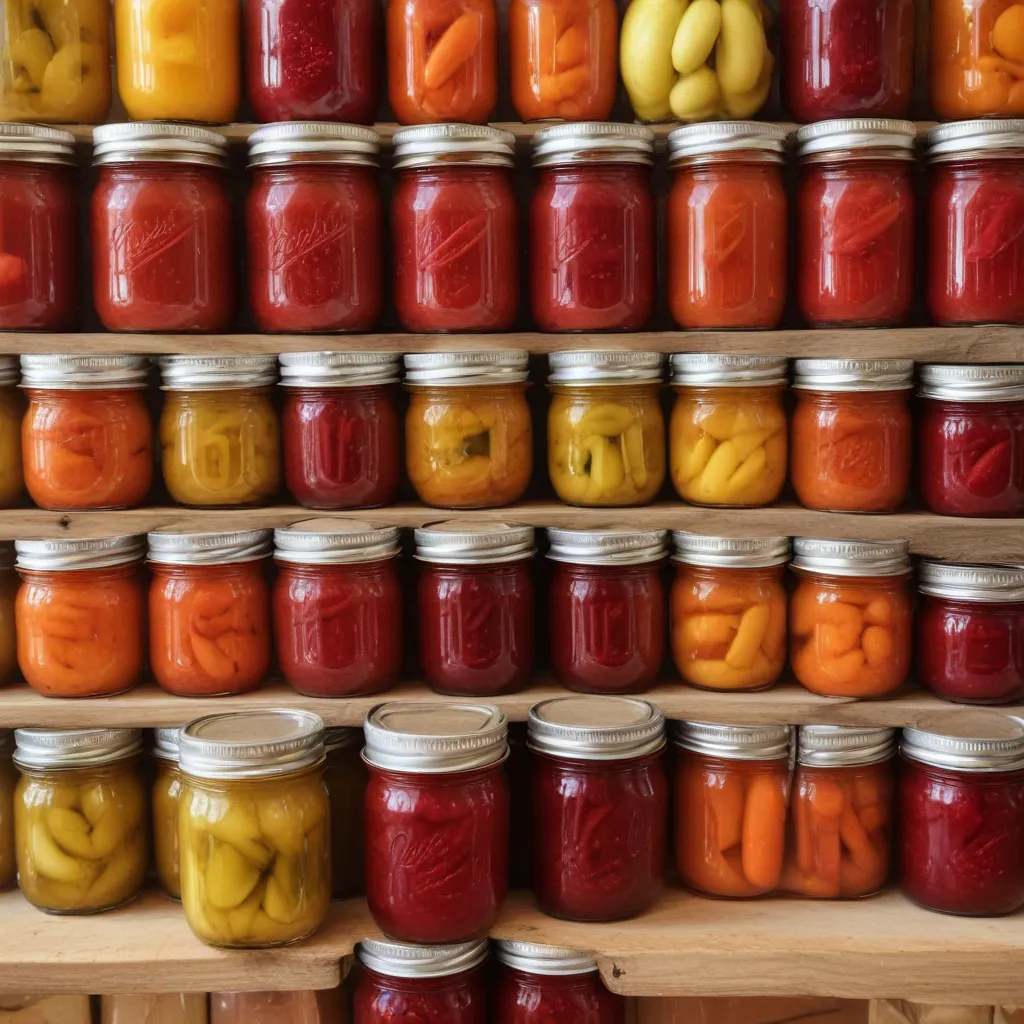
As the seasons shift at Crooked Pines Farm, the time has come to savor the bounty of our hard work. Rows of ruby-red tomatoes, vibrant peppers, and juicy berries are ripe for the picking, beckoning us to preserve their flavors for the colder months ahead. At our annual Canning and Preserving Workshops, we invite the community to learn the time-honored techniques that will allow them to enjoy the farm’s fresh produce long after the final harvest.
Fundamentals of Canning
Canning is a safe and straightforward process to preserve the season’s freshest foods. There are two primary heat treatment methods used in canning: water bath canning and pressure canning. Water bath canning utilizes boiling water to seal jars, while pressure canning employs pressurized steam to reach higher temperatures. The choice between these two techniques depends on the acidity of the food being preserved.
High-acid foods like tomatoes, pickles, jams, and jellies can be safely processed using a simple water bath canner. Low-acid items such as vegetables, meats, and some fruits, however, require the intense heat of pressure canning to eliminate any potential botulism risk.
In addition to the canner itself, essential canning equipment includes sterilized jars, lids, and a jar lifter. The National Center for Home Food Preservation provides detailed guidance on selecting the appropriate jar sizes and processing times for various foods. With the right tools and a bit of practice, even novice canners can master the art of preserving the season’s bounty.
Preservation Strategies
Beyond the classic water bath and pressure canning methods, our workshops also explore alternative preservation techniques that can enhance the flavors and textures of your seasonal produce. Pickling and fermentation, for instance, transform vegetables into tangy, probiotic-rich delicacies that enliven salads, sandwiches, and snack platters.
For those who prefer sweeter preserves, our jams and jellies workshops guide participants through the process of capturing the essence of summer’s berries and autumn’s stone fruits. By incorporating low-sugar or alternative sweeteners like honey and maple syrup, these spreadable treats strike a perfect balance between wholesome and indulgent.
For produce that doesn’t quite fit the canning mold, we demonstrate dehydration and freezing methods. Dried herbs, mushrooms, and greens lend depth to soups and stews, while flash-frozen berries and corn retain their vibrant flavors for use in smoothies, sauces, and side dishes.
Seasonal Produce Preservation
Each harvest season presents a unique set of preservation opportunities, and our workshops explore the best techniques for handling the bounty.
During the summer months, we guide participants through the process of canning tomatoes and peppers, which form the foundation for countless sauces, salsas, and stews. Berries and stone fruits like peaches and plums lend themselves beautifully to jams, preserves, and even fruit leathers. And don’t forget the herbs – fragrant basil, rosemary, and thyme can be dried or frozen to infuse your dishes with garden-fresh flavor all year round.
As autumn arrives, the spotlight shifts to apples, pears, and the harvest of root vegetables and winter squash. Apple butter, pear preserves, and roasted pumpkin puree make delightful toppings, fillings, and side dishes. Carrots, beets, and potatoes can be pickled, fermented, or frozen for long-term storage. And the humble winter squash shines in soups, casseroles, and even breakfast bowls when properly prepared and preserved.
Canning Safety and Best Practices
While canning and preserving provide a wonderful way to savor the harvest, it’s crucial to follow food safety guidelines to ensure the longevity and integrity of your preserved goods. Understanding the importance of pH levels and acidity is key to selecting the appropriate canning method and processing times.
Pressure canning, in particular, requires meticulous attention to detail, from the preparation of ingredients to the monitoring of pressure and temperature throughout the process. Our workshops provide hands-on guidance to help participants develop the confidence and skills necessary to can safely at home.
Beyond just the technical aspects of canning, we also share practical tips and troubleshooting advice to streamline the preservation process. From pre-planning your harvest and organizing your supplies to properly labeling and storing your preserved goods, our experts offer a wealth of knowledge to help you make the most of your bounty.
Community Canning Workshops
At Crooked Pines Farm, we believe that the art of canning and preserving is best experienced in the company of others. Our Canning and Preserving Workshops offer a supportive, collaborative environment where participants can learn from one another, share recipes, and build a network of like-minded individuals committed to sustainable living.
Whether you’re a seasoned preserver or a complete beginner, our hands-on classes cater to a wide range of skill levels. Novice canners can start with the fundamentals, learning the basics of water bath canning and making simple jams and pickles. Those with more experience can delve into advanced techniques, such as pressure canning, fermentation, and crafting unique herbal and vegetable preserves.
Beyond the classes themselves, our workshops also serve as a hub for the local community. Participants are encouraged to bring their own produce, swap recipes, and engage in lively discussions about sustainable agriculture, food security, and the importance of preserving local culinary traditions. By fostering these connections, we hope to inspire a deeper appreciation for the bounty of Crooked Pines Farm and the joy of savoring it throughout the year.
As the vibrant colors of summer give way to the golden hues of fall, we invite you to join us in our annual Canning and Preserving Workshops. Whether you’re looking to master the art of water bath canning, explore the world of fermentation, or simply savor the flavors of the season, our expert instructors are here to guide you every step of the way. So, gather your jars, fire up the canner, and let’s preserve the harvest together!


